- Home
- Joy Dettman
Ripples on a Pond Page 2
Ripples on a Pond Read online
Page 2
Lorna was not at all pleased with her mail-order acquisition. However, if she must prostitute herself to that pint-sized pom in order to gain control of her nephew and her father’s estate, she’d do it – or agree to do it.
Poor little Bernard was not so sure. He took one look at his intended’s size eleven lace-up shoes, her sparrow ankles encased in wrinkled lisle stockings, and had no desire to look higher. Higher was a chin you could hang a coat on, a nose fit only for trumpeting snorts of disdain, ears like a London cab’s open doors, black beetle eyes, a tongue that dripped acid.
There was also a sister, Margaret, a plump and chatty little dormouse of a woman with a head of platinum-blonde curls. Margaret stole Lorna’s intended. Margaret and Bernard married, and before Vern Hooper died, they became the legal parents of Vern’s beloved grandson.
They also gained control of the Hooper estate, until little Jimmy Morrison Hooper Grenville-Langdon reached his thirtieth year, or wed.
HEARTBREAK
At midnight on the twenty-eighth of June, 1969, Margaret Hooper Grenville-Langdon, dying by the inch for months, smiled. She’d seen her handsome son married to his boyhood sweetheart. Morrie’s inheritance now safe from Lorna, Margaret was at peace for the first time in months.
Across the city of Melbourne on that bitter winter night, taxis prowled, looking for late fares. In dark lanes, babies were conceived in the back seats of cars, while others were born beneath the bright lights of labour wards. The homeless sought sheltered corners, and sorely injured animals dragged themselves home to die.
Sometime after midnight, Cara took a taxi home to her tiny dogbox of a flat. She didn’t wait for her change, walked down the drive, cold, shuddering cold, on legs unwilling to obey her mind’s commands while an icy wind funnelling between the buildings attempted to blow her back to the street, back to the hotel, to the bed, to before Morrie had left the bed, to before she’d mentioned Jenny. Wind not strong enough for that.
The concrete staircase leading up to her first-floor flat was too steep tonight. She rested twice, thrice, before reaching her door, where she drew on reserves already depleted to find her key, then find the keyhole with a shaking hand.
‘Do you know your birth mother’s name?’
‘Jenny. Jennifer Morrison, now Hooper. She married her soldier.’
She got it inside, closed the door behind her, fixed the safety chain into its slot, and, in the dark, felt her way to her bed, wanting no light tonight. Couldn’t stand to see herself. Didn’t undress. Kicked off her shoes and slid in beneath the quilt.
Bed too cold, too empty, without him. Beyond crying now, beyond cold, she shuddered with the shame of what she’d done. And the longer she lay in that bed, the clearer the memory became of what she’d done. Morrie was Jimmy, her brother, Georgie’s brother. He was her brother and she’d made love with him!
‘I used to dream about them, the lost boy dreams, I called them. Little Jimmy always trying to find his way home. Back when they started, I knew he was me. They’ve never stopped, but home changed too often for my dreams to keep up, and after a while he wasn’t me, but Peter Pan. He could run like the wind, ride his bike at a hundred miles an hour. He could fly. I loved my lost boy dreams.’
There was a scream inside her that wanted out, a howl of the damned. If she let it out, it would never end. Had to hold it in. Had to get through this night to daylight.
Green luminescent hands of her clock pointing to one thirty. Five freezing hours to daylight. And she couldn’t stand it.
She rose then, and felt her way to the heater, an electric thing of three bars. Turned them on. With all three glowing, they shed light enough to seep through to the bathroom, light enough for her to find the shower taps.
The agent had advertised that dogbox unit as with ‘full bathroom’. It was full, the bathtub using most of the space and the toilet the rest. Tonight, already off balance as she stepped over the bath’s rim, she slipped and fell hard, raking her thigh on the tap before landing on her hip, her elbow. Saved her head, and wondered why she’d bothered. Better if she’d smashed her skull on the tap and finished it.
The shock of her landing, the pain of it, released tears gone underground since she’d walked from the hotel room with her case. She cowered then in the bathtub, hot water raining down. Too hot. Cowered, hugging her knees, head on her knees, howling for her stinging thigh and her bruised hip and her numb elbow – and for him.
She loved him, had been in love with him since she was nineteen. All she’d ever wanted was to live happily ever after with him in his aunt’s five-hundred-year-old manor house, to write a hundred novels there. And with him at her side, she would have. She would have. Loved him, made beautiful perfect love with him.
With her brother.
‘Granny used to say George’s hair looked like a spill of new-minted pennies. I didn’t know what a new-minted penny was, but shiny pennies became Georgie. I had a jar full. Mum and Grandpa used to give me the shiniest ones. I never spent them. I’d sit in the sun, pouring pennies backwards and forwards from a jam jar to a little beach bucket, chanting Georgie, Georgie, Georgie.’
The scream rising again to her throat, she grasped her mouth to hold it inside.
Since she’d turned fifteen she’d known about little Jimmy Morrison. She’d seen photographs of a cute little boy in a sailor suit. Her mother, Myrtle, had looked after him for two years while Jenny had been at work. Until Cara had gone to Woody Creek, the little boy in the sailor suit had been the only one of her other family real to her. She’d wanted to meet him, had wanted to know her big brother.
Had found out tonight that she’d known him since ’65. Loved him since ’65, and he’d picked up his case and his car keys and he’d left her kneeling on cold tiles on the bathroom floor, vomiting. Left her alone to howl.
She wanted to die. Wanted to put the bathplug in and lie face down in the water and drown.
His mother’s fault. She’d lied to him. Jenny’s gone to live with the angels. Or Myrtle’s fault. Phone her. Wake her up in her double bed and curse her, and curse Robert too, for what they’d done with their lies.
Or phone Jenny. Wake that baby-dropping bitch and scream profanities down the line.
The tiny room had filled with steam. It always did. She never opened the window. The drain and sewerage pipe on the outside wall would offer an intruder easy access to her bathroom window. She’d spent her life fearing strangers; spent near half of it fearing Dino Collins, believing the worst that could happen to her would be for Collins to scale that drainpipe and murder her in her bed. Wished he’d climb in now and get it over and done with. She couldn’t live with what she’d done. Didn’t want to live with it.
Or maybe she did. A body’s reflexes won’t allow it to die easily. A body is made to live its allocated span of years.
The gash in her thigh felt deep, long. She got to her feet and turned the water off, stepping more carefully over the rim of the bath on the way out, her hand feeling for the gash. Had to turn on the light to see it.
The tap had peeled off a few layers of skin, but a wad of cottonwool and three bandaids covered it. A dressing-gown covering her, she walked out to her sitting room-cum-kitchen where she turned the heater to a lower setting. Her flat in total wasn’t as large as the old parlour at Amberley. Hot steam plus a three-bar heater had turned the small area into a sauna. She’d stopped shuddering.
Her kitchenette window looked out to the street. She stood, her forehead pressed to cold glass, stared down. Where was he? Where had he gone when he’d left her? Found an all-night bar where he was drinking away his pain.
What about my pain? What about me?
And she wept again, because he’d left her to find her own way home, and because she loved him, and because she’d broken her engagement to Chris Marino and broken her mother’s heart so she could marry her brother – half-brother – and Myrtle had lost her big white wedding. For this?
‘I put them away
in England. Everything stopped over there, the dreams, the moving, the changing faces. I took my middle name when I went to university, determined to be who Mum and Pops wanted me to be. I called myself Morrison Langdon, became the son of an Englishman.’
The window fogged by her heartbreak, she wiped it with her hand, then turned to the cupboard over her sink, seeking something to kill her tears. Only aspros – and Morrie’s bottle of Johnnie Walker in the refrigerator. She got the top off, tried a sip from the bottle and choked on it.
When she could breathe again, she filled and plugged in her electric jug and made a coffee, which she diluted with a worthwhile splash of Morrie’s whisky. It ruined the taste of the coffee, but she drank it like medicine, washing aspros down with it, three of them.
Perhaps the alcohol calmed her, or the aspros. At three fifteen she returned to her bed, where the scent of him remained on the pillow. Scent of the only man she’d ever wanted to go to bed with – brother or not. Loved making love with him, loved waking up beside him and reaching over to kiss his mouth while he was sleeping. Drunk enough not to care if it was right or wrong, she buried her face in the pillow and slept with the scent of him.
Johnnie Walker and aspirin won’t cure the pain of a broken heart, but given half a chance they will wrap a cushion around guilt. At eight on Sunday morning, she repeated the dose then went back to bed. The phone woke her at two. She ran to answer it, knowing it was him.
Only Cathy.
Cara, unable to speak to her, not today, maybe not ever again, eased the phone plug from its wall socket, then crawled back into bed until Monday.
A grey and dreary Monday, but the world still turning outside her window: trams rattling by in the distance, cars whizzing by, horns bleating, an ambulance siren letting the traffic know it was in a hurry. The world would continue to turn. The aged would die, their grandchildren would be born, countries would wipe other countries from the face of the earth, but in the cities of all the world, man would rise up from his bed and go to work to earn his daily bread. And she was supposed to go out there and earn her own.
Couldn’t do it. Couldn’t.
On Friday, when the world had been a perfect place, five teachers and half of her class had been away with colds and flu. No one would doubt that she’d caught their disease. Had to phone the school and let them know.
Myrtle and Robert would have tried to call her last night. They always phoned on Sunday night, at seven. Maybe not. They hadn’t approved of her rushed wedding. Hadn’t driven down to wish her every happiness.
‘Don’t rush into it, pet,’ Myrtle had warned.
She’d never listened to their warnings. Years ago, when Robert had warned her not to go near Woody Creek, she hadn’t listened.
Ring them up and tell them they were right again.
Or ring and tell them that Morrie’s mother had been too sick, that the wedding had been delayed.
If no one knew . . .
Cathy and Gerry knew. Chris knew – or did he? Had she said she was marrying Morrie or just that she was back with him? Couldn’t remember what she’d told him, or if she’d got a word in edgewise to tell him anything. He’d done all the talking, put forward his argument for the prosecution, then found her guilty as charged. Now she was being executed, slowly, painfully.
Had Morrie gone home? Was his mother alive or dead? If she hadn’t told him that Jenny and his sisters were dead, if she hadn’t changed his name.
My fault too, Cara thought. Since she’d turned fifteen and found out about Woody Creek, Robert had referred to that town as Pandora’s box. She hadn’t listened. ‘Don’t open it, poppet.’ How many times had he said that? ‘It’s a good place to stay away from. It’s not for you, poppet.’
Not for her, but she’d gone there anyway, and opened up a gateway to the plagues of hell.
If I hadn’t gone there, I would never have known of Jenny’s and Georgie’s existence, would never have spoken their names to Morrie. And even if he’d mentioned them in some future year, I wouldn’t have known who he was speaking about. Might have wondered why our babies were inbred idiots.
What if . . .
A week of sex wasn’t enough to get pregnant. Helen, one of the married teachers from school, had spent three years trying to get pregnant, then lost it at eleven weeks – and her husband worked with Chris Marino. He’d know about the broken engagement, so Helen would know.
Barely a dribble left in the Johnnie Walker bottle, but she drained it into a glass and added a dash of milk. Her stomach was trying to tell her it was hungry. Stomachs expected to be fed. She hadn’t fed hers since emptying it on Saturday night.
Looked at her watch. Unwound for two days, it was dead. As was her clock. Looked at her disabled phone, then pushed the plug into its socket and dialled the number for the speaking clock.
At the third stroke, it will be eight fifty-five and thirty seconds . . .
She wound and set her watch while the jug boiled, wound her clock, set it to the correct time then made a coffee, all the while glancing at the phone, attempting to raise incentive enough to call the school and claim the flu.
*
Nine thirty before she told her lie – and the office woman’s sympathy made her howl. Turned her television on to muffle the sound of her tears, then sat all day staring at moving pictures and seeing nothing.
Went to bed that night with the television playing. It was better than silence. She couldn’t stand silence. Went to bed too early, and was evicted from dream too early by a raucous early-morning cartoon show.
Still dark outside, and in the dark she knew she couldn’t run away from what she’d done, that the alternative to surviving it was to die of it, and that dead was dead was dead and there was no more. And she couldn’t afford to die anyway – her rent was overdue. So much happening last week she’d let her payment slide. She couldn’t afford to die at least until December. Her dogbox was leased by the year, and the lease wouldn’t be up until 18 December, and if she died, the agent would go after Robert for the rent, and he was having enough trouble paying off his bank loan – his and her bank loan.
She’d been twenty, in her first year of teaching, when her parents had converted Amberley into four units. Robert had been sixty-six, retired, on a departmental pension. The bank hadn’t trusted him or Myrtle to live another twenty years, so they’d tacked Cara’s name onto the loan. And who was going to pay it when his knee crippled him and he had to give up tutoring, and Myrtle, the last of the big spenders, donated his pension to her church’s latest scheme?
Responsibilities got her into the shower. Having decided that she couldn’t die for at least fifteen years, she decided she may as well go to school and pay her rent at lunchtime. The estate agent was just around the corner from the school.
The habit of teaching the sniffling kids she’d dismissed at three thirty last Friday helped. They didn’t know her world had ended over the weekend.
Helen knew of her broken engagement, but Cara dodged her at lunchtime and escaped to a misty street and the estate agent’s office. Wrote him a cheque, and told him again that her security-chain knob was still missing. He told her again that he’d get onto the owner. It was an old habit they had: she complained; he promised. Old habits were good habits today.
Walked a block to a corner pharmacy to replenish her supply of aspros, and while there asked the assistant if she had any stronger painkillers, for a toothache. The assistant offered a choice of two, along with a tiny bottle of liquid to rub around the tooth. Doubtful that the liquid would ease a broken heart, she left it on the counter, but bought the aspros and both packets of pills, both containing codeine. Some, when they could no longer stand their lives, reached for heroin. Codeine was a close relative. For lunch that day, she swallowed one from each packet with a milkshake, then returned through heavier rain to her rabble.
And could barely keep her eyes open.
The office woman disturbed her nap at two. ‘You’ve got a phone call,
Miss Norris.’
Maybe it was him.
Just Cathy again. ‘I thought you’d be up here, or on your way.’
‘It’s a school day, Cath.’
‘Did Morrie call you?’
‘My phone is disabled,’ Cara said.
‘His mother died last night.’
Should have said, ‘How terrible’, or ‘That’s sad’, or ‘Poor Morrie’. Should have found something to say. Nothing came to mind. She’d met his mother twice: for five minutes three years ago, when she’d been released from hospital after they’d found the lump in her other breast; then on Saturday, when she’d stood at her bedside for ten minutes. She’d read a lot about her in Morrie’s letters. For years their letters had flown backwards and forwards across the ocean.
Why hadn’t he mentioned his lost sisters?
Why hadn’t she mentioned her ‘sort of’ adoption?
She had to say something. Like . . . like . . . she chose a very opportune time to die, didn’t she? She’d lied to Morrie for most of his life and now he couldn’t even accuse her.
‘Are you all right?’ Cathy asked.
‘My class is unsupervised.’
‘He needs you up here. He’s not thinking straight,’ Cathy said.
‘We’ve got four staff members off with the flu.’
‘Your mother-in-law just died!’ Cathy said. ‘Tell them. They won’t expect you to work.’
‘I’ll talk to you later. I have to go.’
‘You can talk for a minute. Did you get to meet his ghoul of an aunty?’
‘No.’
‘He brought her back here with him–’
‘The kids will be wrecking the classroom.’
Cathy had taught until she’d married Gerry. She knew about unsupervised kids.
‘I’ll pick you up this arvo,’ she said. ‘If I leave now, I should be there in an hour or so.’
‘No.’
‘He needs you. His father has lost his marbles, his aunty is as snarly as a staghound with fleas–’
‘I’ll come up for the funeral.’

 The Hope Flower
The Hope Flower Trails in the Dust
Trails in the Dust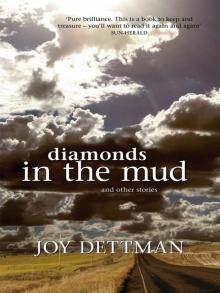 Diamonds in the Mud and Other Stories
Diamonds in the Mud and Other Stories Moth to the Flame
Moth to the Flame The Tying of Threads
The Tying of Threads Wind in the Wires
Wind in the Wires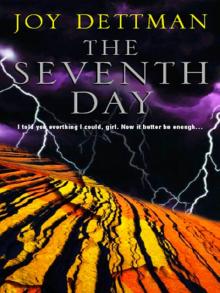 The Seventh Day
The Seventh Day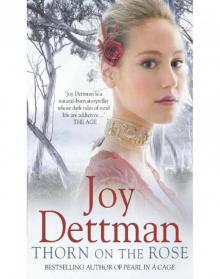 Thorn on the Rose
Thorn on the Rose Jacaranda Blue
Jacaranda Blue Mallawindy
Mallawindy Ripples on a Pond
Ripples on a Pond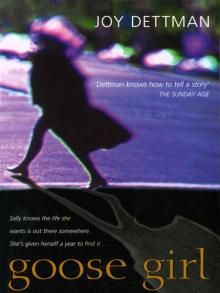 Goose Girl
Goose Girl The Silent Inheritance
The Silent Inheritance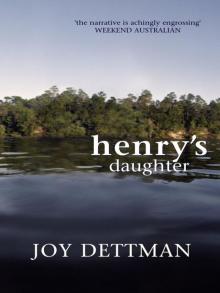 Henry’s Daughter
Henry’s Daughter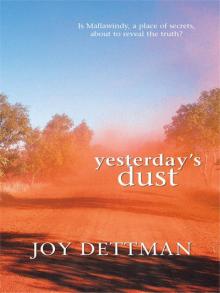 Yesterday's Dust
Yesterday's Dust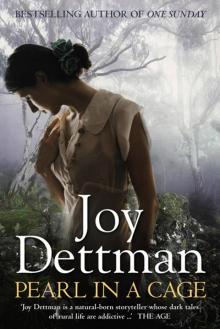 Pearl in a Cage
Pearl in a Cage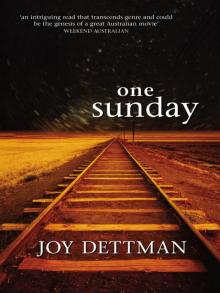 One Sunday
One Sunday